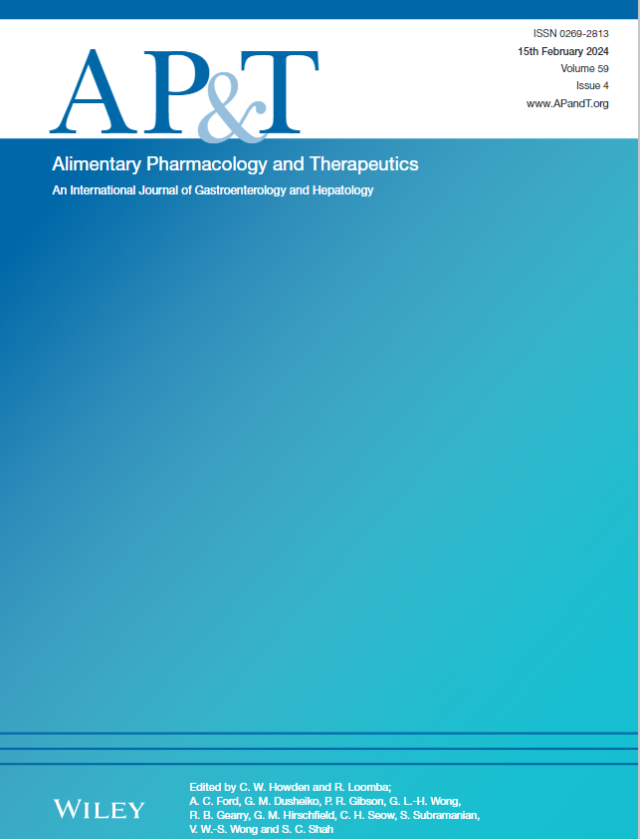Bradycardia and Other Arrhythmias in Patients With Hepatorenal Syndrome-Acute Kidney Injury Following Terlipressin Treatment: A Pooled Analysis of Three North American Phase III Clinical Studies.
IF 6.7
1区 医学
Q1 GASTROENTEROLOGY & HEPATOLOGY
引用次数: 0
Abstract
BACKGROUND Terlipressin is the FDA-approved systemic vasoconstrictor therapy for hepatorenal syndrome-acute kidney injury (HRS-AKI)-a rapidly progressive renal failure occurring in patients with decompensated cirrhosis and ascites. Bradycardia, a known effect of terlipressin, as well as other arrhythmias, has previously been reported in terlipressin-treated patients. AIM To assess terlipressin-related cardiac adverse events (AEs) in patients with HRS-AKI. METHODS Three North American-centric Phase III, randomised, placebo-controlled studies (OT-0401, REVERSE, CONFIRM) were pooled in the largest-to-date prospective database. Cardiac AEs were reported by the investigators for each trial and retrospectively analysed. RESULTS Bradycardia was the only cardiac AE reported more frequently in terlipressin-treated patients compared with placebo (6.3% [22/349] vs. 0.8% [2/249]). In the terlipressin group, no bradycardia AEs were serious, 4.5% (1/22) of patients required a dose interruption, 9.1% (2/22) required a dose reduction, and none discontinued treatment due to bradycardia. The incidences of other arrhythmia AEs were similar in both treatment groups (terlipressin: 7.4% [26/349]; placebo 8.8% [22/249]). The incidence of atrial fibrillation serious AEs (SAEs) was low (terlipressin: 0.9% [3/349]; placebo: 1.6% [4/249]). There were no AE reports of torsades de pointes, while a QT interval prolongation was reported in two patients. CONCLUSIONS In a pooled analysis, bradycardia was observed in 6% of terlipressin-treated patients but rarely required a dose interruption or reduction. Arrhythmia SAE incidences were low and similar in both treatment groups. Routine intensive cardiac monitoring for the detection of arrhythmias may not be necessary during terlipressin administration. TRIAL REGISTRATION OT-0401: NCT00089570, REVERSE: NCT01143246 and CONFIRM: NCT02770716.特利加压素治疗后肝肾综合征-急性肾损伤患者的心动过缓和其他心律失常:三个北美III期临床研究的汇总分析
特利加压素是fda批准的用于肝肾综合征-急性肾损伤(HRS-AKI)的全身血管收缩药物,HRS-AKI是一种发生在失代偿性肝硬化和腹水患者中的快速进行性肾衰竭。心动过缓,特利加压素的一种已知效应,以及其他心律失常,先前在特利加压素治疗的患者中有报道。目的评价特利加压素相关心脏不良事件(ae)在hr - aki患者中的作用。方法:三个以北美为中心的III期随机安慰剂对照研究(OT-0401, REVERSE, CONFIRM)汇集到迄今为止最大的前瞻性数据库中。研究人员报告了每项试验的心脏ae,并对其进行回顾性分析。结果:与安慰剂相比,特利加压素治疗组出现心动过缓的频率更高(6.3%[22/349]对0.8%[2/249])。在特利加压素组中,没有严重的心动过缓ae, 4.5%(1/22)的患者需要中断剂量,9.1%(2/22)的患者需要减少剂量,没有人因心动过缓而停止治疗。两组其他心律失常ae的发生率相似(特利加压素:7.4% [26/349];安慰剂8.8%[22/249])。房颤严重ae (SAEs)发生率较低(特利加压素:0.9% [3/349];安慰剂:1.6%[4/249])。无针尖扭转的AE报告,但有2例患者报告QT间期延长。结论:在一项汇总分析中,6%的特利加压素治疗患者出现心动过缓,但很少需要中断或减少剂量。两个治疗组的心律失常发生率均较低且相似。在特利加压素给药期间,可能不需要常规的强化心脏监测来检测心律失常。试验注册ot -0401: NCT00089570,反向:NCT01143246,确认:NCT02770716。
本文章由计算机程序翻译,如有差异,请以英文原文为准。
求助全文
约1分钟内获得全文
求助全文
来源期刊
CiteScore
15.60
自引率
7.90%
发文量
527
审稿时长
3-6 weeks
期刊介绍:
Alimentary Pharmacology & Therapeutics is a global pharmacology journal focused on the impact of drugs on the human gastrointestinal and hepato-biliary systems. It covers a diverse range of topics, often with immediate clinical relevance to its readership.

 求助内容:
求助内容: 应助结果提醒方式:
应助结果提醒方式:


